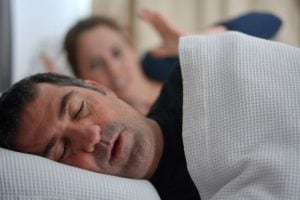When Is It Time to See a Sleep Specialist?

In this blog, sleep apnea specialist Dr. Marc Levin of eos dental sleep in Philadelphia, PA, explains when it’s time to see a sleep specialist.
What is sleep apnea?
Sleep apnea is a very common yet serious sleep disorder that’s characterized by repeated pauses in breathing while you sleep. You may not be aware of these stoppages since they probably don’t wake you up completely. As a result, many cases of sleep apnea are undiagnosed and untreated.
It can have serious effects on your health and well-being since your sleep consistently moves from a deeper stage into a lighter, less restful one. Your blood is also deprived of its normal amount of oxygen. Many troubling symptoms, as well as an increased risk of other chronic health issues, are associated with this sleep disorder.
What are the symptoms of sleep apnea?
Since many cases of sleep apnea go undiagnosed, it’s helpful to familiarize yourself with its symptoms so you can ask your doctor about them and get the treatment you need:
- Chronic daytime sleepiness, even if you spend enough time in bed
- Loud chronic snoring, especially when you sleep on your back
- Pauses in breath noticed by another person
- Gasping or choking sounds as your breathing resumes
- Morning headaches
- Dry mouth or sore throat when you wake up
- Frequent need to urinate at night
- Difficulty remembering, learning, and/or concentrating
- Irritability
- Depression
When is it time to see a sleep apnea specialist?
If you’re experiencing the previous symptoms, you should make an appointment to see a sleep apnea specialist. He or she may recommend a sleep study, which is the only way to confirm or rule out a diagnosis of sleep apnea.
What are the treatment options for sleep apnea?
The following are some of the most common treatment options:
- CPAP (continuous positive airway pressure) machine – Often the first type of treatment tried, this machine delivers a low, steady stream of air through tubes and a mask you wear on your face. This helps keep your airway open as you sleep.
- Oral appliances – Especially for patients who can’t tolerate a CPAP machine, an oral appliance can be an excellent alternative. It’s a comfortable custom-made device similar to a mouth guard, and it’s only worn at night. This appliance gently coaxes your jaw and/or tongue gently forward to help keep your airway open.
- Lifestyle changes – Sleeping on your side, avoiding alcohol and sedatives, losing weight if you need to, and quitting smoking may help make your symptoms less severe.
- Surgery – Sometimes a structural problem such as nasal polyps or a deviated septum is the underlying cause of sleep apnea. When that’s the case, you may need surgery.
If you’re experiencing any symptoms that may be associated with sleep apnea, make an appointment today for an evaluation with sleep apnea specialist Dr. Levin at eos dental sleep in Philadelphia, PA. We’ll gather the information needed to make an accurate diagnosis and provide the most effective, least invasive treatment possible.
